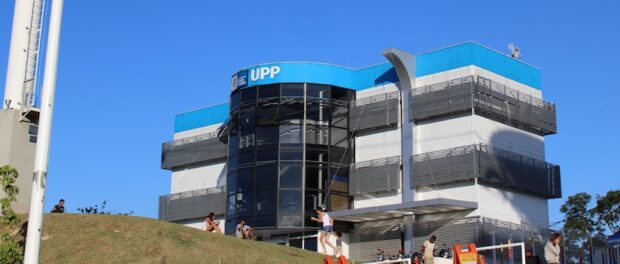
For the original in Portuguese by Cléber Araujo, resident of Complexo do Alemão, published in Agência de Notícias da Favela, click here. This is a satirical piece.
After various meetings and revisions given the countless errors committed by the government, the public authorities have just created a new UPP. That’s right, with this very nomenclature. It is the UNIT to POTENTIALIZE the POOR. Hostility towards the former [UPP] project led to the emergency creation of this new attempt to give significance to the polemic and failed project of the State, that recognized its mistakes and therefore decided to give life to this new Unit.
We have therefore decided to conduct an analysis of what this new moment entails and what exactly it is the government will be putting into action in the State’s favelas and peripheries.
Firstly, a permanent forum would be crated including knowledgeable popular and academic figures, and managed by local residents, so that through them the real needs of each area would be identified. Those involved have no ties to political parties or NGOs, with no personal interests, only collective ones, since these meetings would define the concrete actions to be carried out.
Secondly, with the presentation of proposals comes the division of tasks and duties (note a caveat, that those involved will be remunerated by the State) and at this point a new chapter would start in the history of the favelas, only this time with a solid and proper initiative, bringing a light of hope to many, as residents will receive an injection of morale and greater integration into the city. The residents who get involved would become transformative local agents in their alleys, their street, and in this way help their local area before anything else, putting macro actions aside and working ‘in loco,’ where they live, where they have childhood friends, taking responsibility for influencing many others.
At a third point in time, we would see direct action by the public authorities after previously realized public consultations, with the purpose of executing what was learned and installing what I would call “KNOWLEDGE BASES”—places with access to the most diverse information for residents’ development. These places would be chock full of books and accounts of local history, computers with Internet access, document printing and access to everyone’s correspondence. Ideally this would be funded by residents to provide a sense of ownership. There should be about ten of these bases spread out in strategic locations across the favela, with easy access for all, including access for the elderly who may have limited mobility.
In the fourth phase, local culture would be disseminated and incentivized, weekly events planned with local organizers who already do this in the territory, carrying forward and redeeming local values through residents themselves and in this way strengthening local businesses, generating income for those who have always lived in the favela. The events would be carried out by the favela, for the favela, without intermediaries, without gaps or (imposed) limits. It would also be a great campaign of personal strength for each resident, enabling them to interact more with their place of origin, spending and consuming locally, valuing those who provide training on financial administration, home economics, means of generating income, even autonomously. The more people were enabled, the more residents would be POTENTIALIZED.
We would be induced to learn and POTENTIALIZE ourselves and others, something which has been done for years among those who govern this world; they are taught from childhood, in their homes, in their schools and universities, to potentialize each other, which until today has been denied us. We were robbed of the right to be critical beings, this has been the great crux of the issue. When we’re not encouraged to think of others, we’re removed from everything that enables our survival. Equal rights, good schools that have teachers, safety that is truly provided by public bodies committed to local communities and not corrupt or bloodthirsty outsiders. Honest and incorruptible local administrators who don’t allow themselves to be seduced by crumbs to back electoral campaigns. When there is an understanding that the favela can self-manage, and isn’t just a MARGINALIZED place, a place seen only from a dark and shadowed perspective, then you can be sure that we have understood POTENTIALIZATION.
Given these few observations I managed to list—and a handful are still missing—I propose and dream of the creation of this new government project, and also a change in the nomenclature of the old Pacifying Police Unit – UPP, to UNIT TO POTENTIALIZE THE POOR. Who knows, maybe we’ll see an awakening on the part of the sagacious critics of this genocide currently taking place, so as to help potentialize us rather than seeing us dead as just another newspaper statistic.
This text is a dream, the wish of someone who lives here in an enormous favela, which today is militarized by a failed project and which has demonstrated countless mistakes, which has no type of dialogue. Today we see ourselves imprisoned, not knowing what to do, with no one to defend us… So I thought up this text in UTOPIAN form and I’d like it to one day become real, that one day we could have the opportunity to be POTENTIALIZED INSTEAD OF MILITARIZED.
